Voices to End FGM/C Cohort #9 – Hybrid Digital Storytelling Workshop
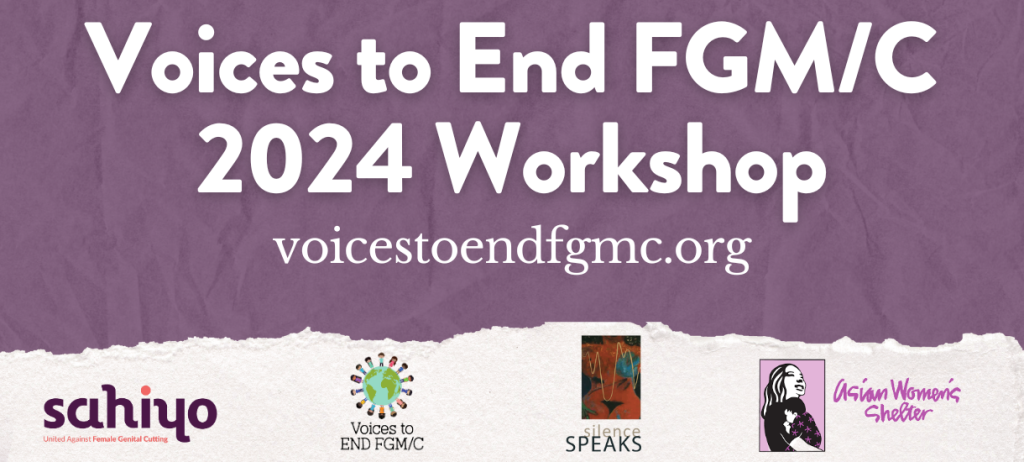
We’re hosting our second hybrid-format Voices to End FGM/C Digital Storytelling Workshop this June 2024! Survivors and advocates will share their stories and learn to craft them as short videos. This participatory media process will be guided by facilitators from Sahiyo, Silence Speaks, and Asian Women’s Shelter. Online Workshop Dates: Tuesday May 28 and Tuesday June 4 (via Zoom). In-person Workshop Dates: Saturday and Sunday June 22 and 23. In-person Workshop Location: Washington, DC. Who Can Apply: Individuals living in the U.S. who have experienced FGM/C, as well as family members, friends, advocates, and others living in the U.S. who would like to share a story about the impact of FGM/C in their lives. Note: we are not able to accommodate overseas applicants in this session. Apply online today! Application Deadline: April 15, 2024. TRAVEL SCHOLARSHIPS ARE AVAILABLE for those in need of financial support to attend the workshop! To learn more about the Voices workshop experience, watch our behind the scenes videos.
Passion, Purpose, Party: My take on Sahiyo’s Activists Retreat
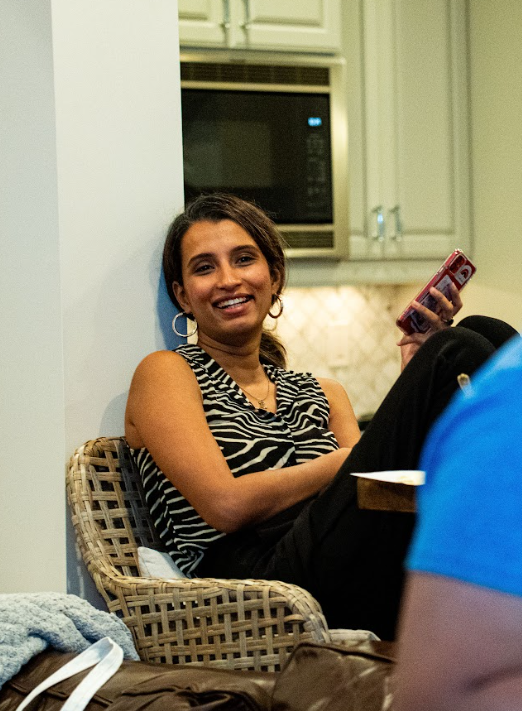
By Lubaina Plumber I remember being 21-years-old, a wide-eyed, aspiring human rights lawyer in Bombay (Mumbai for those who don’t properly identify with the ethos and pulse of the city that never sleeps) when I first stumbled upon, completely accidentally, the grave violation of female genital cutting (FGC). Suddenly, it all came rushing back to me. The event, the place, the people, the gross invasion of my body, my privacy and my rights. I froze in time to realize that this was not just a human rights issue I was researching for a work project, but also something I had survived as a meek 8-year-old child. Through this enlightenment came my connection to Sahiyo. Whilst all concerns around the protection and rights of human beings were within my realm of redressal, I knew at that moment that FGC was personal and a cause I felt deeply triggered by. This harmful practice angered me not only for every single person who endured it, but also for myself and my own experience. Once something becomes personal to you, it is seldom something you can let go of. Advocating against FGC and creating safe spaces for survivors and allies to engage in open dialogue and sharing became a primary focus for me, ultimately leading me to finally attend the Sahiyo in-person Activists Retreat in 2023. My activism and journey came full circle when I sat around the beautiful living room of a fellow Sahiyo member who graciously hosted a group of passionate, remarkable people in her home. The moment I landed in Atlanta, I remember feeling slightly nervous. I had just immigrated to the United States six months prior and this was my first interaction with a group outside of my small workplace. I felt I was venturing out in an unfamiliar country to discuss deeply personal things. After spending three glorious days with the other participants, I can say I have now found people that feel as familiar as my own (brb, wiping tears). I’d be lying if I said I did not thoroughly enjoy the delicious meals, warm hospitality, and thoughtful welcome package/goodie bags as well. But what stood out most were the conversations I had with everybody present, about FGC and about everything else just the same. The Retreat was extremely well-planned and executed even better. I am a staunch proponent of open, authentic, non-judgemental spaces, and the Activists Retreat delivered on all fronts: confidentiality, comfort, and thoughtful sharing. I assumed I knew everything about FGC, given my extensive preoccupation with the issue, but I gleaned SO MUCH from this experience. The toolkits, guest speakers, group activities, and personal anecdotes of others were tremendously enlightening; they helped keep me apprised of the global discourse on FGC. I felt I was not alone in this peculiar world, feeling intensely passionate about issues important to me; there are other kindred souls out there too. The sense of sisterhood, profound empathy, and unadulterated opportunity to be vulnerable is what I will cherish for a long time to come. I am hopeful for the future. For myself and millions of affected individuals needing a platform, a team, an understanding ear, and tangible redressal measures. I discovered I could visit an OBGYN in the United States and share that I underwent cutting, inquiring exactly how my body differs. This notion would not have even crossed my mind before attending the Activists Retreat. I have become even more vocal, forthcoming, and resolved in my mission to mitigate FGC. I have initiated difficult dialogues, broaching the subject with adequate context. I have learned to be patient with ignorance (still letting out the odd sigh and eye roll), gentle yet assertive with the uninformed, and fierce with those who willfully endorse these violations against people/children with or without family consent. I do not take no for an answer when it comes to educating somebody on FGC and that courage has grown knowing there is a whole community who will back me up with loving reinforcement when I need that gentle push. Thank you team Sahiyo for including me in your passion, purpose and party! SEE YOU AGAIN NEXT YEAR 🙂 Learn more about Sahiyo’s Activists Retreat here.
Reflecting on the 2023 Activists Retreat
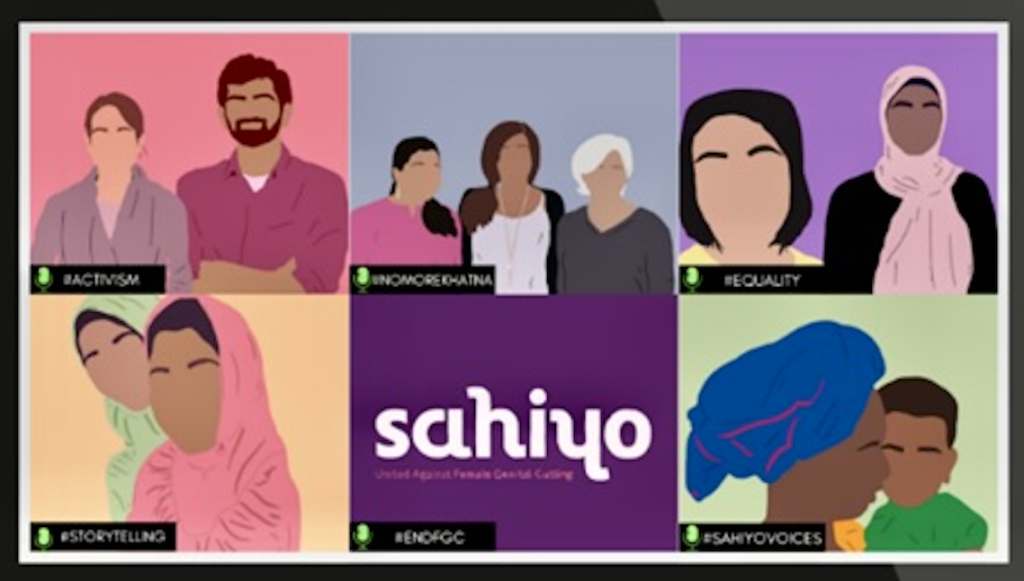
By Samman Masud In September 2023, activists, survivors of female genital cutting (FGC), and community members from the Bohra community came from all over the U.S. to gather in-person at Sahiyo’s 6th annual Activists Retreat. This three-day affair, in Atlanta, Georgia, brought together individuals belonging to the Bohra community to deepen relationships with one another, increase knowledge on FGC, and gain tools on how to advocate against FGC. This year, as in the past, the Retreat was filled with presentations, educational videos, group discussions, action planning sessions, and self-care activities. During the Retreat, survivors and community members were able to reflect on their personal experiences and connection with FGC in a safe and supportive environment, explore advocacy strategies, and discuss challenges they face in trying to discuss FGC. Having recently joined Sahiyo in August 2023 as their Community Engagement Coordinator, this was my first time attending the Activists Retreat. Although I assisted Sahiyo staff and volunteers to prepare educational materials in the weeks leading up to the retreat, I arrived in Atlanta not knowing what to expect from the attendees at the retreat. To say that the three days I spent with other activists in Atlanta were humbling and inspiring would be an understatement. While I had read academic papers and participated in discussions about FGC in class settings during graduate school, I had little knowledge about the prevalence of FGC within Bohra diaspora communities in the U.S — something I developed an in-depth understanding of from the presentations and survivor testimonies at the retreat. Listening to survivors who were Bohra recount their experiences with FGC, and other Bohra activists at the retreat reaffirmed to me the significance of community-led movements. I noticed that the activists, from various age groups and diverse personal and professional backgrounds were able to comfortably share their experiences of FGC and anti-FGC activism in a safe space–one that was void of ‘othering’ or Islamophobic narratives that are often invoked by human rights organizations when communities of color discuss gender-based violence. It was promising to see that the activists, despite their personal and professional commitments, took out time to be with other like-minded individuals to learn, and restrategize how to best address FGC within their communities to achieve lasting results. Together, we participated in workshops, engaged in difficult but important conversations, which were followed by self-care activities like journaling exercises or yoga at the patio that allowed us to unwind and relax. We concluded this year’s Activists Retreat with individualized and group action plans to improve anti-FGC advocacy efforts and left with renewed commitments for our cause. As Sahiyo develops our Activists Retreat program in the future we hope to expand this program to other communities impacted by FGC. [youtube url=”https://youtu.be/4bsrA1aW-ME”]
Join us in-person at Sahiyo’s 2023 Activists Retreat

By Umme Kulsoom Arif This September, from the 15-19th, Sahiyo will host its annual Activists Retreat in person for the first time since the COVID-19 pandemic. For many Sahiyo volunteers and retreat alumni, it will be the first time in several years that activists, volunteers, and survivors will meet in person; we would love to have you attend! The 2022 Sahiyo Activists Retreat was the first time I spoke about my experience as a female genital mutilation/cutting (FGM/C) survivor in a real-time group setting. Though virtual, being surrounded by other survivors and activists candidly sharing their experiences with one another, offering sympathy and support, was an experience I will never forget, and I am incredibly grateful for it. Activism is work. Whether private or public, it can feel very exhausting to make yourself vulnerable time and again, speaking about an often stigmatized and hidden subject. It can also feel incredibly lonely to speak out against deeply held convictions and traditions that seem to go back generations. Before 2022, I felt adrift in my trauma and my grief, wanting to be an activist but feeling unsure of what I could provide, and also afraid of the obstacles I would face in speaking up. In my 2022 Retreat Reflection, I spoke candidly of that fear. My gender identity and sexuality have been shaped by my experience with FGM/C This had lead to me feel reluctant to share my experiences, especially as I myself felt trapped in the angriest stage of grief. The 2022 Activists Retreat, however, came with community and confirmation that my emotions were valid, that I was enough for wanting to speak up and speak out. The 2022 Retreat taught me how to grieve, taught me the value of community, and taught me the most important thing — we are not alone. This year, in May, I had the honor of attending a one-day virtual retreat, where I met and spoke to survivors and those whose parents protected them from FGM/C, a perspective I had not anticipated hearing from, and simultaneously, one that brought me much joy. The voices of those who have begun to break the tradition of FGM/C are vital to the activist movement, and I am delighted to hear more of them joining the conversation. We are delighted to offer travel scholarships for domestic travel to Atlanta, Georgia, as well as housing and meals. I invite you to join us for three days of healing and hope, all supported by Sahiyo’s incredible team and wonderful Retreat Planning Committee.
Applications open for the 2023 in-person Bohra Activists Retreat

From September 15-17th, Sahiyo U.S. will host our 7th Activists Retreat in Atlanta, Georgia. Sahiyo hosts annual Activist Retreats to bring the Bohra community together in a safe space and discuss the issue of khatna (or female genital cutting) in efforts to collaboratively work towards ending it. Since 2018, over 60 people have taken part. Participants of the Retreat are often people speaking out against FGC — who work either publicly or anonymously — to raise community awareness about the need to end this harmful practice. Anyone with a connection to the Bohra community based in the U.S. is welcome to apply! Apply to the 2023 in-person Activists Retreat here. Bohra U.S. Activists Retreat 2023 Frequently Asked Questions Who is this retreat for? The Sahiyo Activists Retreat is open to anyone who is connected to the Bohra community and who is interested in ending the practice of khatna and other types of FGM/C. Learn more about what the retreat is all about from past retreat attendees who have written for our blog! Also watch this video. I am not an “active” member of the Bohra community, am I still welcome? Yes! You do not have to be a “card-carrying” member of the Bohra community to attend. Your connection to the Bohra community can be cultural and/or familial. I was not subjected to khatna/I was subjected to khatna but I do not recall my experience/I was subjected to khatna but I have had no adverse effects from my experience. Am I still welcome? Yes! One does not have to be subjected to trauma to have an interest in ending the practice. Everyone has a responsibility to do something and everyone interested in doing something can benefit by meeting with others who want to take action and learn more about what can be done. How much does it cost to attend the Retreat? There are no fees to attend Sahiyo’s Activists Retreat. Travel scholarships are also available to reimburse Retreat attendees for their domestic travel. Will I have to get my own hotel and pay for my own food? Nope! We do not want cost to be a barrier to attending this event and have sought out funding to be able to support all retreat attendees with lodging, travel, and food costs will be covered by Sahiyo. If you have any food restrictions, preferences, or allergies, please do not hesitate to let us know as we get closer to the date of the event! Is it possible to attend the Retreat virtually? While Sahiyo has hosted Virtual Retreats for activists in the past, the September 2023 retreat is intended to be an in-person retreat. We have not hosted an in-person event since 2019, and are looking forward to the connection that can come through gathering in-person. If you are interested in attending virtual retreats in the future, please be on the lookout for future virtual retreat announcements! We would still love to see you in person in September! Is it possible to attend the retreat for just a single day? The purpose of the Activists Retreat is to allow activists to get together over the course of an entire weekend to build community, find support, and plan for future activism to end khatna or FGC. We ask that retreat attendees be able to attend all three days of the retreat in order to participate in all of the events, discussions, and presentations we have planned What should I bring to the Activists Retreat? Bring yourself, a positive attitude, and some space in your suitcase for swag if you’re traveling in to attend! What sorts of things will I learn at the Activists Retreat? A more complete agenda of events will be released to all Retreat Attendees closer to the date of the event. At this time, Retreat Attendees can expect to meet other activists, speak about their experiences as activists, and also learn from guest speakers. We will also have discussions about future activism, community building, and the Sahiyo Activists Toolkit. Learn more about Activists Retreat by visiting our blog and hearing from past participants themselves. Do you have more questions? Email us at info@sahiyo.org today!
Do I belong? Reflecting on the Activists Retreat

By Sakina Sharp Sahiyo’s annual Activists Retreat is a great way for both women and men connected to the Bohra community to discuss the issue of khatna, or female genital cutting (FGC). This is my third year attending the event, and I appreciate that this Retreat offers a safe space to have conversations about khatna. The first year I attended the event, I wondered if I belonged; I did not know if there was a space for someone like me who grew up Bohra, but does not currently fulfill all the requirements of the culture. I also wondered if there was a space for those Bohras who do “all the things,” and stand up against the practice of khatna. When I attended the Retreat, I realized that there was space for both. I found the Retreat to be cathartic, and it gave me an opportunity to process what had happened to me as a child. During this recent Retreat, the question of belonging came up again, but this time with a different flavor. Some participants wondered if they belonged because they had not personally undergone FGC. We all wonder if we belong, and the truth is, we all do. Men belong because we need their voices in the rooms where discussions on FGC are taking place. Women who have not undergone FGC belong because they can prevent future generations from holding on to this practice. Practicing Bohras belong because FGC is not a religious practice; we can be religious and still stand against khatna. Survivors belong because we know first hand the impact of khatna. All of our voices are important, and we all belong. Learn more about Sahiyo’s Activists Retreat here.
SAHIYO JOINS OVER 40 COMMUNITY ORGANIZATIONS SERVING SEXUAL ASSAULT AND DOMESTIC VIOLENCE SURVIVORS IN $13.2 MILLION AMERICAN RESCUE PLAN INITIATIVE
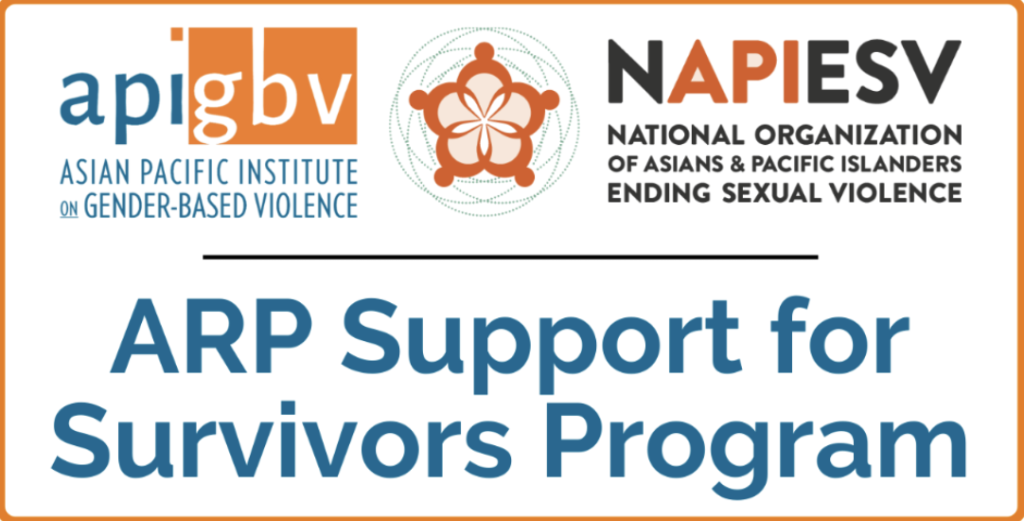
ARP Support for Survivors Program supports culturally-specific, community-based projects supporting survivors of domestic violence and sexual assault from Asian and Pacific Islander Communities in the United States and the Pacific. Sahiyo U.S. will be joining over 40 organizations, both nationally and locally, in an effort to provide culturally-specific, community-based support for survivors of domestic violence and sexual assault from Asian American and Pacific Islander (AAPI) communities across the U.S. and Pacific. The $13.2 million dollar initiative from the Family Violence Prevention and Services Act (FVPSA) under the 2021 American Rescue Plan (ARP) will be will be the first time API-GBV will be distributing two years of funding to culturally specific organizations that serve sexual assault and domestic violence survivors in AAPI communities; this includes survivors of female genital mutilation/cutting (FGM/C), marking huge progress that this harmful practice is being recognized as a form of sexual assault. Under the ARP Support for Survivors Program, subgrants will be distributed through the Domestic Violence and Sexual Assault Capacity Building Fund to assist organizations like Sahiyo U.S. to provide services for survivors of gender-based violence in Asian/Asian American, Native Hawaiian, Pacific Islander (AANHPI), and Middle Eastern (ME) communities in the United States and U.S. territories. “Sahiyo U.S. is honored to be included as one of the 40+ organizations awarded this grant. For too long the issue of female genital cutting has been viewed as a cultural issue, this grant helps to affirm that FGM/C is a form of gender-based violence and is a form of sexual assault that impacts individuals from AAPI communities as well. For years, Sahiyo has heard stories from FGM/C survivors from these communities and we have sought to support them in sharing their experiences and connecting with one another to collectively heal, and band together to prevent the next generation from undergoing this form of harm.” ~ Mariya Taher, Sahiyo Co-Founder & U.S. Executive Director The ARP Support for Survivors Program will address the emergent needs of survivors, and the programs that serve them, resulting from the COVID-19 public health emergency. The work will also promote strategic partnership development and collaboration in responding to the COVID-19 public health emergency on survivors of gender-based violence. “API-GBV is honored and proud to welcome organizations like Sahiyo U.S. who are at the forefront of sexual assault and dometic violence work amid the COVID-19 pandemic. It is essential to have this kind of funding distributed to communities with organizations deeply rooted in their environmental and cultural awareness and expertise in supporting survivors. The AAPI community is often left out of the public narrative on sexual assault and domestic violence and through this important work we will have the opportunity to support organizations who directly support survivors in our communities.” ~ Monica Khant, Executive Director of API-GBV Sahiyo U.S. was selected by a committee of peer reviewers with extensive experience in the domestic violence and sexual assault fields, and working in AANHPI and ME communities in the U.S. Funding provided under the ARP Support for Survivors grant will advance our survivor and community-based Activists Retreat program. The expanded program will help to further strengthen relationships and networks among survivors and impacted community members who need a supportive structure, but who are often geographically distant from one another. The program will also allow for best practices and tools to be shared not only during the workshops, but throughout the year. As a result, FGM/C survivors and impacted community members are able to enhance their own well-being and enhance skills to more effectively raise awareness in their respective communities about the need to end this harmful form of sexual assault. Sahiyo U.S. is among 15 organizations serving AANHPI communities and 14 organizations serving ME communities, including projects focused on prevention, culturally specific services for Queer and Trans survivors, virtual services and data security, culturally rooted practices in healing and resiliency, and engaging men and youth. For a complete list of grantees, visit this link.
Activists Retreat Reflection: What community means to me
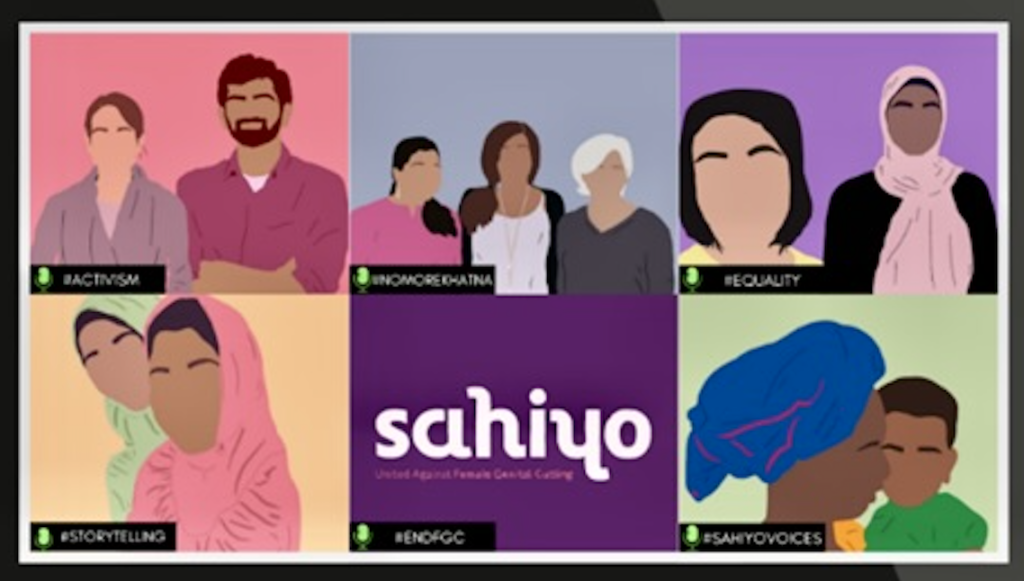
By Zehra Patwa My fifth experience at the Sahiyo Bohra Activists Retreat in June 2022 was, once again, eye opening, supportive, and so much fun; in particular, because I met a whole new set of North American Bohras I didn’t know before, as well as a couple of Bohras from Europe! This year, all participants (except for the planning committee) were first time attendees. It reminded me of my first time participating at the Activists Retreat, and how I felt such a part of the community during, and after. Community can mean so many things to so many different people. When we talk about the Bohra community, many feel remote from it. They may not agree with all the edicts that are sent down from Central Dawat, or they’re not fully paid up, card-carrying members of a jamaat. This is a shame, because there are so many different people who identify as Bohra or who have a connection to the Bohra community; in fact, I heard a number of attendees speak of “not being part of the Bohra community.” Thankfully this event brings these people together; here we all were at a Bohra Activists Retreat! Community is what we make of it and the anti-FGM/C Bohra Activists Retreat is, to me, an incredibly warm, supportive and fascinating community that I hope to be part of for a very long time. I so appreciate the support I get from the Retreat each year. It reminds me that we are not alone and that many people care about the work we activists do. Read the report on this year’s Activists Retreat.
Activists Retreat Reflection: A shift that was needed

By Amena Ali This was my second time participating in the Activists Retreat, and my first Retreat on the planning committee. I thoroughly enjoyed this year, and especially the shift from last year compared to this year. Last year was very focused on people relating to each other in sympathy, and this year it was more about being able to release anger and your anger being validated. I think that shift is really nice to see, because it also portrays how far people have come, in regards to their process for coping, for accepting, and fighting against this. I was really lucky to be a part of that, and I hope in the future, we’re able to do this in person! Read Amena’s reflection on participating in the 2021 Activists Retreat here. Read the report on this year’s Activists Retreat.
Activists Retreat Reflection: Umme’s experience

By Umme Kulsoom Arif When I was first invited to join the 2022 Sahiyo Activists Retreat I was… terrified. I almost didn’t sign up. I wanted to be an activist and I wanted to do more with Sahiyo, but I was scared of both.. Being both non-binary and a survivor of FGM/C, I always thought of myself as being in limbo — did my identity as a non-binary individual somehow invalidate the pain of my cutting? Was I less valid within the LGBTQIA+ community because of the trauma I had endured that shaped the way I viewed my gender and sexuality? Was I less valid within the Sahiyo community because I was only perceived by others to be a woman, as opposed to actually feeling like one myself? What did gender and sexuality even mean in the context of being a survivor, an activist, a Dawoodi Bohra, both in the closet and outside of it? I was scared. Every step of signing up — from filling out the interest form to creating my bio to sending my first message in the groupchat — was something I procrastinated, almost dreaded doing, because it cemented the feeling of walking into a den of lions. I wondered if I would be judged as harshly as I feel I am by the Bohra community I know, by my extended family, by myself. I don’t know what compelled me to take every step, but I’m glad that I did. The moment I logged onto that Zoom call and faced the community waiting for me, I realized: this was what being safe truly felt like. I sat, listened, and heard my thoughts, fears, and emotions echoed back to me in the voices of those who — like me — had either gone through or knew someone who had endured an injustice the likes of which I still struggle to properly name. Grief is a strange, frustrating thing. I never know what to grieve — does one mourn the moment one learns about the loss or the moment of the loss? Do I mourn the teenager tentatively coming out to their mother, and learning suddenly just how little their family valued their autonomy over the words of a man they had never met, or do I mourn the frightened five year old girl-who-one-day-would-not-be, laying on a cold metal table and feeling gloved hand wipe away her tears in an operating room? Or is it both, embracing all that fear, anger, and agony that comes from not knowing and needing to know at the same time? Even before the Retreat, I had been grieving. I went to therapy, I laid in bed and wallowed in my depression; I bargained with a God I almost didn’t believe in anymore for a justice that did not come; I denied the magnitude of what had been done to me, insisting that others had it so much worse and that I needed to just move on; I accepted the things I could not change and resolved to use my law degree to help others just like me; and… I raged. Quietly, internally, I burned with fury I could not share. As an activist, I knew I had to take a measured response because those who were for FGM/C would use anything, including the tone of activists, to decry and deny the validity of the campaign. But pain is not measured, it is not reasonable; it is a cruel, burning thing, and I found myself repeatedly wondering if I was even ready to do this activism thing if I couldn’t control my emotions. I felt like a bad person for being angry until the Retreat, until I heard the same emotions in the voices of others and realized the bottled up and tamped down anger was not an aberration, but a reasonable response. While it needed to be edited and pared down and softened to be shared with the world at large, it could be shared here, amongst others who knew the truth. It can feel isolating and infuriating to go against the grain of one’s own community, to be ostracized and judged and feel betrayed by one’s own family to the point where one loses faith. I felt alone, until I didn’t, until I realized there were others who felt as alone as I did. Which is a weird thing to feel, I think. What the Retreat offered me was a confirmation that I was not alone or an aberration, and that I was enough simply for wanting to speak up and speak about my story. I made friends. I was invited to speak about my identity as a non-binary survivor — which in itself was terrifying, but I did it and found myself feeling even more validated through that experience — and realized both the value of having a global community of people with whom I could be my most authentic (and slightly odd) self and of forgiving myself for the things I could not do in that moment. Read the report on this year’s Activists Retreat.
